I have long considered myself an armchair anthropologist of the rich. It is, to be sure, the softest of the sciences, this plush discipline of mine, but it is also the most enjoyable.
Not all rich people are worthy of study, and not all powerful people are rich, though that is increasingly rare. The rich who do nothing bad with their money—they give it away to poor people, they drive old Volvos, they give refreshingly candid interviews that do not make them sound like psychopaths—they are a small subset to be ignored. Wealth must be spent, power must be exercised, and the manner of that spending and exercise is what we so colloquially know as class. Class is more than a socioeconomic tier: it is the very flavor of power itself, and to categorize it properly, we must come to this discipline with full, emphatic fascination at our disposal.
I am fascinated by rich people for the same reasons that you are fascinated by rich people: because I too would like to be rich, and I am certain that I would be very good at it.I am fascinated by rich people for the same reasons that you are fascinated by rich people: because I too would like to be rich, and I am certain that I would be very good at it. However, having accepted otherwise, probably unlike you, I will settle for my humble research, collecting, among other peer-experienced riffs at dinner parties, a set of precise observations about what is George, the Magazine, (flying your own plane to death! So George!) and what is George Cambridge, the person (shitting your pants while sitting on the lap of a queen, wearing sweaters with dogs on them). George: Opening your empty handbag to find only a broken dog biscuit and a Xanax, eating them both. George Cambridge: sleeping against a woman’s gown at the Opera. Both things, you see, are George: inherited privilege, firmly mainstream taste, references that could be ‘esoteric’ (Birkin, Xanax, Opera) but are in fact quite broad. It is the method of public sleeping which differs in the order of signification. Taste classifies, of course, and it classifies the classifier. Yes, I am as tenured a scholar as you may find in the field. And, like a newly-enwealthed oligarch hatching from their golden egg onto the tarmac of some private airport while forgetting to tip, I am here to brag about it.
As did most graduate students who attended an unaccredited graduate school, I had to do a lot of reading. Novels are excellent for this as they usually involve a great deal of fabrication, which is the essential quality of a rich person: they live their entire life based on the lie that they deserve more money than everyone else. Certainly there is plenty of nonfiction, biographies and autobiographies of rich lives, the literal word from the horse’s mouth, but that so often lacks the clarifying, acidic flavor of exposed hypocrisy that so many not-rich novelists are able to imbue. And we must see the lie for what it is to truly enjoy it—the misery of the supporting cast of other wealthy characters, and how bad their lives are on that nicer patch of grass, the one with the sturdiest fence around it.
Protagonists who believe this lie—that money, and not radical political change, will make their lives better—are very easy to relate to. We can stand in their boots, feel them yank the straps, and watch them powder their hands as they assault the greasy pole. This feels like we, too, are working our way up the ladder, ascending into rich people heaven onto a bed of cake. Better yet if they kill someone along the way, particularly someone rich, whose life they will hopefully assume, and like the proverbial us, live it far better than their victim ever could.
Class is the greatest weapon of the rich: It convinces us, through corridors of prestige and refinement, that the consolidation of wealth has value, that without it you cannot have culture or distinction, that it lives part and parcel with individuation, that a finer life is a better life. It is, IMHO, the best and most effective form of violence in a novel, as it punishes everyone it touches and generates drive for everyone who tastes it. We are always better off than someone—and someone is always better off than us. Class consciousness turns us against each other and weaponizes all our social instincts. And with that: please allow me to present this (naturally incomplete as it is personal) list of novels about class-conscious narrators, which I thought about a lot while writing my second novel, Fake Like Me (out in June, it follows a young painter who meddles in the lives of artists she believes to be more successful and secure).

The Secret History, Donna Tartt
I love this book about five students tempted to their doom by the appeal of ritually sacrificing their peers at a rich-kid-daycare New England college, but I do think Julian, the “esoteric” Greek professor who fuels their worst impulses, has not aged very well. He runs his tutorials from a white-painted room full of lace doilies, a teen girls’ shabby-chic bedroom by way of Target in 2001, and is the last person in the world to inspire a bacchanal—he’s old and frail, not some hot bull like they had in that one season of True Blood. However, you can breeze through the Julian bits and enjoy the rest of the book easily, as the draw of the collective is enough to make it hum along (scream, while being pushed off a cliff).
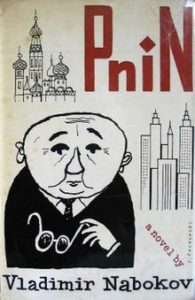
Pnin, Vladimir Nabokov
Timofey Pnin, a bald little professor who loves to show off his tanned shins, is Nabokov’s own avatar-as-fool, a Russian émigré trying to hold onto his dignity at a girls’ college in New England. Pnin’s English is terrible, he doesn’t understand the customs of his new country, everyone makes fun of him behind his back—but instead of seething, he sobs and bumbles. The violence is mostly social, except for one moment in a sink, which will make you cry for the rest of your life. The mystery here is about the narrator—who, exactly, is telling us these sweet weird sad little tales of this lonely man—and it ends in whatever the Russian word is for bittersweet.
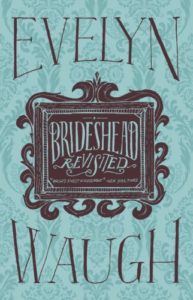
Brideshead Revisited, Evelyn Waugh
Oh Bridey! Evelyn Waugh is a glass of champagne served in the summer grass by a sad, beautiful young man. He is the starch in a collar that will never get dirty, he is the feeling of removing a polished wingtip shoe after a very good party, he is a rhubarb-and-rosemary custard finished with a whiff of lemon zest, a lavender salt in a hot bath. This one, told by pleb Charles Ryder, recalls his friendship with the aristocratic Flyte family and exactly what happened at their ancestral pile of rocks, the eponymous Brideshead, and it is so tender and sad.
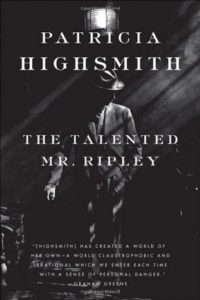
The Talented Mr. Ripley, Patricia Highsmith
No list of class-conscious narrators can forget Tom Ripley, who memorably used both an oar and an ashtray to bludgeon his victims, and got out of it at the end with the hilarious upper-class assumption that any man who gives away his jewelry must be headed for suicide. If you haven’t read this, consider yourself lucky. Spooky evenings of nose-in-book await you, after which you will wonder, for weeks, if it is truly that important to make new friends.
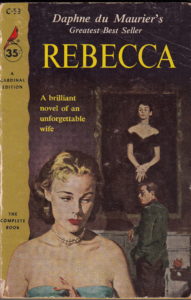
Rebecca, Daphne du Maurier
The nameless protagonist of Rebecca is faced with a still-prescient choice: be a poorly-compensated handmaiden to a grotesque employer, or marry the mysterious, wounded widower who represents the top of the heap of social capital that pushed her to the bottom at birth. She chooses to marry; he is revealed to be terrible; they live out their lives in depressing hotels at seaside resorts during the off-season, playing cards. However, it is riveting, and extremely, extremely scary.

The Outsider, Richard Wright
This is the book Wright wrote this after he left the communist party and became a nihilist, and this book is steeped in expositions of race, class, and political relations like no other work of twentieth-century fiction. His protagonist, Cross Damon, is alienated, angry, and does not change. Damon doesn’t believe that money will change his life, but he knows that power would, and his rage at being made so powerless by a society that hates and devalues anyone who with skin that is not white metastasizes until he kills four people, and then later dies. People didn’t like this book at the time it was published because it has extremely long passages about existential despair, but that is exactly why I love it.
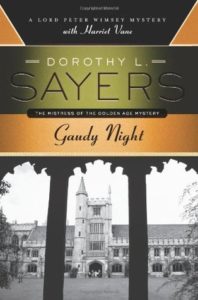
Gaudy Night, Dorothy L. Sayers
The penultimate of the Lord Peter Whimsey series, written by one of the twentieth century’s foremost snobs, Gaudy Night takes place at Oxford where Whimsey’s paramour, writer Harriet Vane, investigates a series of poison-pen notes. The infinitesimal distinctions of the British class system are on full display here. The book moves through problems of town and gown, woman and academy, and single and married life, all from Harriet’s posh-puncturing perspective. Sadly, at the end, she marries him instead of setting off on her own, but it can’t be helped now.
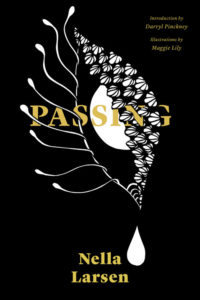
Passing, Nella Larsen
Clare and Irene were childhood friends. Clare, who is biracial, can pass for white; Irene, who is black, cannot, and their unexpected meeting after twelve years apart in a hotel in Chicago sets off a series of encounters that end in Clare’s death. It’s a genuinely moving and tightly written narrative about a bisexual and biracial woman who passes through doors that would otherwise be closed, and the friend who stands aside, barred from entry.
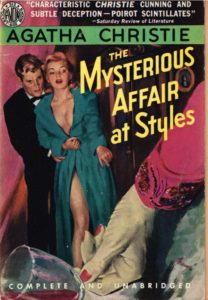
The Mysterious Affair at Styles, Agatha Christie
Nobody encompasses neurotic class consciousness quite like detective Hercule Poirot, who, while European, is Belgian, specifically, Walloonian. The Wallons are to the French as the coal workers of the Adirondacks are to the tennis set of Kennebunkport: that is to say, “not our class.” I grew up speaking Walloonian French and to this day, upon a single *efficient* utterance of “nennant” in lieu of “quatre-vignt-dix” (“ninety” instead of “four-times-twenty-plus-ten” for the number 90), the nearest “real French” person will simply begin speaking to someone else. Poirot’s affinity for his moustache, his desire for cleanliness at all costs, his obsession with “the best” of everything, his mere Belgian-ness, makes him the perfect foil to Christie’s high-class drawing room murders. This book, first in the series, is where you should begin.
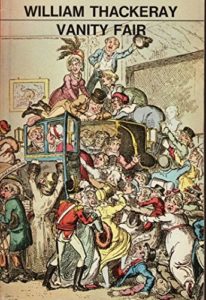
Vanity Fair, William Thackeray
This epic novel set during the Napoleonic Wars focuses on Becky Sharp, who, as was custom until women were allowed open entrée into professions besides marriage or sex work, hopped from one husband to another. The daughter of an artist, Becky has taste, but no social standing, and in an unfortunate self-sacrificing twist, sells herself out at the end to help her rich friend escape a philandering husband. Everything is great until that happens.

















